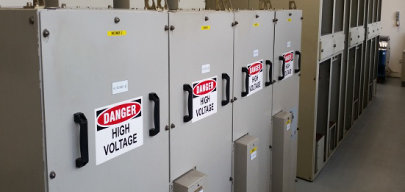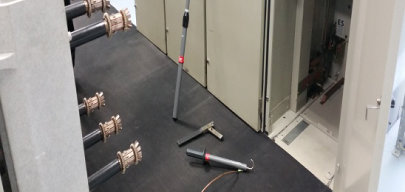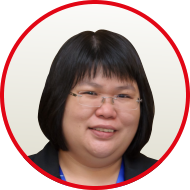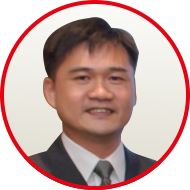High Voltage Safety on Ships
The 2010 Manila Amendments to the Standards of Training, Certification and Watchkeeping for Seafarers (STCW Convention) will be fully implemented on 1st Jan 2017. All existing Deck and Marine Engineering Officers are required to attend additional courses to comply with the requirements of STCW 2010.
During the last decade, the ships have become bigger and powered by high powered propulsion and electrical systems. Mammoth container ships, passenger ships and other large vessels are fitted with huge capacity electrical power generation units. Such ships are usually fitted with high voltage installations (HVI) for higher operating efficiencies and to reduce the size of electrical equipment. In some ships, the power generated onboard could be as high as 1-4 mega watts which is similar to the electrical power needed in a small town.
This requires marine engineer officers to be trained in the operation and maintenance of HVI and in diligent application of safety regulations and procedures relating to high voltage.
MPA recognises HVI courses conducted in Singapore at the Singapore Maritime Academy (SMA) and Assets Training & Technical Services Pte Ltd (ATTS). The course typically covers the design and installation features of HVI and how to operate it safely. Topics included are the generation of HVI in generators and the associated electrical machineries. The course also includes practical experience with relevant equipment to reinforce safety procedures such as permit to work and isolation procedures. Holders of or those aspiring to hold the Marine Engineer Officer (MEO) certificates of competency (COC) as Class 1, 2 and 5 are advised to attend the appropriate HVI Course so that they can revalidate their COC and be able to serve on HVI ships.

Danger signage of HV panels

Bus bar in dismantled position
Do You Know the MPA staff?
The Ship Investigation Department (IVD) under the Shipping Division, conducts investigations into marine casualties and incidents that occur onboard Singapore-registered ships anywhere in the world or incidents within Singapore waters. Safety investigations conducted by IVD are carried out to find out the cause of the incident to identify lessons learned and are not conducted to apportion blame or determine liability. We would like to introduce the following staff members from the Ship Investigation Department:

Ms Chai Bing Ying started her career with MPA at the Seafarer’s Management department in 2001 where her primary duties included updating crew information, issuance of Certificate of Endorsement, seaman discharge book, seaman card and other counter duties.
She was transferred to the office of Director (Shipping) in 2012 and was assigned to the Ship Investigation department (IVD) as a management support officer. In addition to providing support to the Director’s office, her key responsibilities for IVD include communicating with shipping companies, Flag States and Port States to seek and collate information relevant to casualty-related information following a marine incident. She also compiles and populates the statistics for incidents investigated by the Ship Investigation department.
Although a non-mariner, Ms Chai's decade long experience in MPA has taught her about the various aspects of the shipping industry and she is known by peers to be a methodical and meticulous officer. She was involved in the coordination, planning and the conducting of the IMO Model Course on Marine Accident and Incident Investigation as a part of the IMO’s Third Country Training Programme (TCTP) in 2013, as well as the Marine Accident Investigators Forum in Asia (MAIFA) in 2015 where she was able to network with the delegates of member states.

Mr Yeo Lee Chuan holds the post of a Manager/Investigator with the Ship Investigation Department. He is part of the marine accident investigation team, and is primarily responsible for conducting statutory investigations when parallel investigations are called for.
Having served the Republic of Singapore Navy for 11 years, subsequently as a PSA Marine Harbour Pilot for 5.5 years and a couple of marine operation exposure for 3 years, Mr Yeo attributes his industry experience spanning over 15 years as the key for him to acclimatize and acquaint himself onto the essentials of the job.
Aside from his core function, Mr Yeo is currently assisting on the study of air emissions from ships, which is geared towards the comprehensive benchmarking and sustainable initiatives for the MPA's Next-Generation Port 2030. In-line with MPA’s future-ready framework towards a safe, efficient and sustainable global hub port as well as being a responsible maritime administration, Mr Yeo aspires to improve the safety awareness of the seafarers, reducing their vulnerability due to human errors and to reduce injuries and fatalities.
